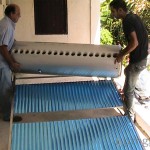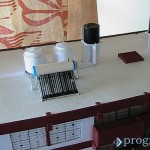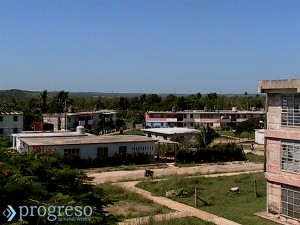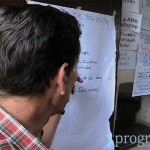
The other current
The ecological debt that we are leaving for the future generations who will inhabit the planet is becoming irreversible — and rising. In a very short time, nobody will be able to say that he didn’t know that.
But, while the environmental and economic cost of crude oil rises, some people in Cuba dare to dream and bet on getting all of their power needs from Renewable Sources of Energy (RSE).
“In the end, we’ll have to change the energy matrix not only of this country but also of the world,” says Juan G. Morales de la Lastra, a lawyer who is the future president of Cuba’s first cooperative for energy production based on RSE.
“We are not going to be the solution to the big problems in Cuba, but we can be the solution to 15, 20 or 100,000 small problems,” he says.
The initiative is born in a country that, according to Alfredo López Valdés, Minister of Energy and Mining (MINEM), imports 53 percent of the fuel it needs. Ninety-six percent of its generation of electricity depends on oil; only 4.3 percent of that is produced from RSE.
In other words, Cuba needs alternatives that not only promote the diversification of an energy matrix based today on fossil fuels but that are truly sustainable, in terms of the economy and the environment.
Cuba’s policy of subsidization of the sector has not solved the disparities between the demand for and the supply of fuels. On the contrary, it continues to generate expenditures for the State Budget, and the process of distribution experiences heavy losses.
At the most recent plenary session of the National Assembly of the People’s Power, Marino Murillo, vice president of the Council of Ministers, explained that a single family in Cuba consumes an average 180 kilowatt-hours per month, for which it pays 36 CUP (about 1.4 dollars), but the process of generation and distribution costs the government six times that amount.
Meanwhile, the prices of crude oil in the international market continue to rise. And despite the agreements of cooperation with Venezuela on the importation of crude, Cuba finds itself forced each year to raise large sums of money to satisfy domestic demand.
In fact, the country’s total production of fuel in 2011 was about 4 million tons. And at the time it was said that 84 percent of the electricity was generated with Cuban crude, whose sulfur content is higher than the standards set by the industry.
On the other hand, the greatest consumption of electricity in Cuba occurs in the residential sector, with 54.5 percent of the total usage. Taking these indicators into account, many specialists agree that at least part of Cuba’s energy future could be based on local initiative.
A power production cooperative?
The new cooperative envisions the production of energy based on RSE. It will offer the specialized services associated with that activity “to me and to whoever wants to receive them, connected to a network or in isolation (a person or a collective),” says the cooperative’s president, Juan G. Morales.
“And there will always be an energy surplus that we can sell, as a loan, to the national network or to any neighbor who needs it,” he adds.
“In January 2012, when we submitted the project, there were many things that were not defined,” Morales says. “Oil is power. There is an established scheme and we are entering that scheme to provide different solutions.”
According to Morales’ logic, from a legal point of view, there was no indication that the topic of cooperatives would assume such importance. Due to the amount of initiative and creativity expressed in this type of economic association, the regulations should be adjusted as time goes by, he says.
 The MINEM views positively the creation of this type of cooperative “above all to work on the assembly and maintenance of all the equipment [that will be installed], but at a local level,” explains Rosell Guerra Campaña, director of the MINEM’s Renewable Energies department, who has managed power plants for most of his career.
The MINEM views positively the creation of this type of cooperative “above all to work on the assembly and maintenance of all the equipment [that will be installed], but at a local level,” explains Rosell Guerra Campaña, director of the MINEM’s Renewable Energies department, who has managed power plants for most of his career.
No rule or regulation bars these new economic actors from the actual production of energy.
“It is true that there is a willingness to change,” Morales continues. “But we don’t have to sit around and wait for someone to tell us what to do. Otherwise, the cooperative would never have been created. If what I present is in accordance with the approved policy, it must be carried out.”
In that legal dimension, the RSE had suffered from the absence of a legal policy and regulation that would propel its development.
To Alejandro Montesinos, director of the Cubasolar Publishing Company, and the magazine “The Energy and You,” Cuba’s energy structure, “which gives privilege to the combustion of hydrocarbons, is sustained by laws that don’t specify the role of the RSE. […] A bold framework of regulations would serve as a channel of communication between foreign investments and state budgets.”
On the other hand, without a law that politically and financially supports the development and participation of the RSE, as many Latin American countries do, the cooperatives “will remain at a disadvantage and under conditions of inferiority as a result of the distortions in the world markets of crude and electricity.”
That’s the opinion of Conrado Moreno, professor at the Center of Studies for Renewable Energy Technologies (CETER) and member of the Cuban Academy of Science.
Among other reasons, the RSE have not had a leading role in Cuba because the “Program for the Utilization and Perceptive Development of the Renewable Energy Sources and Efficient Use of Energy for 2013-2030” was only recently approved.
As reported during the plenary session of the National Assembly, legislation covering the issue is currently being studied. In the opinion of some specialists, this law will include provisions that will prioritize and “reward” the use of RSE with a policy of loans and flexible taxation.
“Our matrix has two big problems: One, it is very expensive to generate a kilowatt-hour of electricity in Cuba [21 cents of a CUC, or 21 U.S. cents, per kilowatt-hour); two, power generation is dependent on oil consumption […] That is why the Council of Ministers approved a policy,” said Marino Murillo in early July.
In this context, the endeavor of Juan Morales and nine other cooperativists is more valid than ever in the country’s current socio-economic context.
![011]() A focus on locality
A focus on locality
For years, many arguments have been used against the use of RSE, especially because of the cost of exploitation technology. But in the rest of the world the participation of these innovations grows 20 percent annually, says Conrado Moreno.
In Cuba, the new program outlines the actions and paths that will enable the RSE’s participation in energy generation to expand from 4.3 percent to 24 percent in the next 15 years.
Although an increase in the participation of the RSE is projected, the reduction in the use of fossil fuels is still low in relation to the length of time. The country’s energy demands are expected to grow in the next several years, especially in view of the enactment of the new Law on Foreign Investment.
Notwithstanding the “stability” foreseen for the future consumption of fossil fuels, Cuba has already signed contracts with Russia for the construction of four wind turbines in the Mariel Development Zone, which will guarantee energy to that industrial area and could even supply the national power network with its surplus charge.
The Russian loan contemplated in that contract amounts to 1.6 billion dollars, but the diversification of Cuba’s energy matrix is expected to cost 10 billion dollars.
It is true that the technologies for the construction of large wind or solar parks are expensive, though the cost has declined in recent years. But the real cost of generation from non-renewable sources (just in terms of injury to the environment and human life) is a lot higher than previously estimated.
On the other hand, the country cannot afford to change one scheme of dependency for another, which goes directly against economic autonomy and national sovereignty.
“There are people who want to come to Mariel and build small turbines, and that’s where I see the future of Cuba, because if you set up those devices next to people’s homes, any Cuban can repair them, I assure you,” says Juan Morales.
Many alternatives can be conceived through local and individual initiative. Examples abound. And the opportunities could multiply when individuals can access technologies with the proper credit facilities. According to Rosell, that proposal is being analyzed.
Right now, the project of the first cooperative in Cuba devoted to the production and distribution of energy is limited to the local milieu “without a desire for self-aggrandizement,” Morales says. The idea is “to work, work and work, with an economic sense, above all, for the benefit of our relatives and my cooperative members, who are part of my homeland.”













